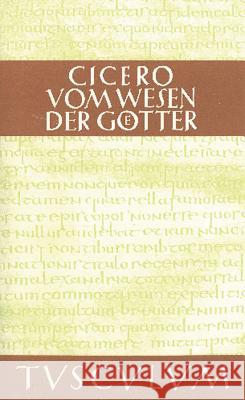Vom Wesen Der Götter / de Natura Deorum: Lateinisch - Deutsch » książka
Vom Wesen Der Götter / de Natura Deorum: Lateinisch - Deutsch
ISBN-13: 9783050054520 / Niemiecki / Twarda / 2011 / 608 str.
Since 1923 the Sammlung Tusculum has published authoritative editions of Greek and Latin works together with a German translation. The original texts are comprehensively annotated, and feature an introductory chapter. In the new volumes, additional essays delve into specific aspects of the works, illuminating their historical context and reception to the present day. The high academic quality of the new editions together with clearly written essays and annotations make the Sammlung Tusculum essential reading for students who are discovering an ancient author for the first time as well as professional scholars who would like to gain a deeper understanding of specific aspects of a given work. Moreover, the series is ideal for lay readers who would like to engage with antiquity through a reliable German translation. The series contains over 270 titles, available in print and eBook editions, making previously out-of-print titles and rarities available again for the first time. In order to celebrate the 90th anniversary of the series, De Gruyter is proud to present Tusculum Online, an eBook package which contains all titles that appeared between 1923 and 2013 - a fitting tribute to an important part of German publishing history. For more information, please see www.degruyter.com/tusculum
"Wenn es auch viele Fragen in der Philosophie gibt, die bis heute noch nicht genügend geklärt sind, so ist doch die Frage nach dem Wesen der Götter ganz besonders schwierig und überaus dunkel..." (1,1).§Um eine Klärung bemühen sich im Haus von Ciceros Freund C. Aurelius Cotta neben dem Hausherren, der die Schule der Akademiker vertritt, der Epikureer C. Velleius und der Stoiker Q. Lucilius Balbus. Cicero - zum fiktiven Datum der Unterredung (76 v.Chr.) mit etwa dreißig Jahren der Jüngste - begnügt sich hauptsächlich mit der Rolle des stummen Zuhörers. Seine Gesprächswiedergabe besticht durch die Schärfe der Gedankenführung und die meisterhafte Komposition. Ihm verdanken die Römer zum großen Teil die lateinische Terminologie, die weiteren Kreisen den Zugang zur griechischen Philosophie erst ermöglichte.§Olof Gigon und Laila Straume-Zimmermann haben den Text neu übertragen und mit profundem Detailwissen und philosophischem Weitblick kommentiert.











